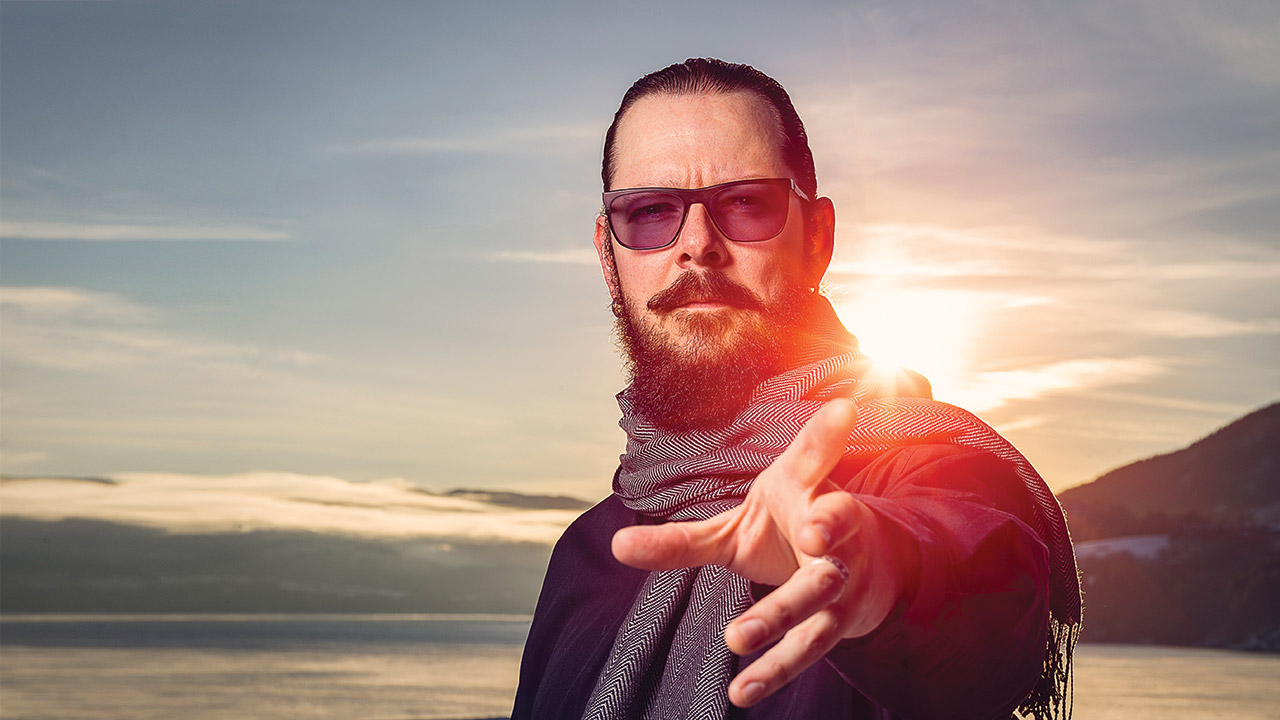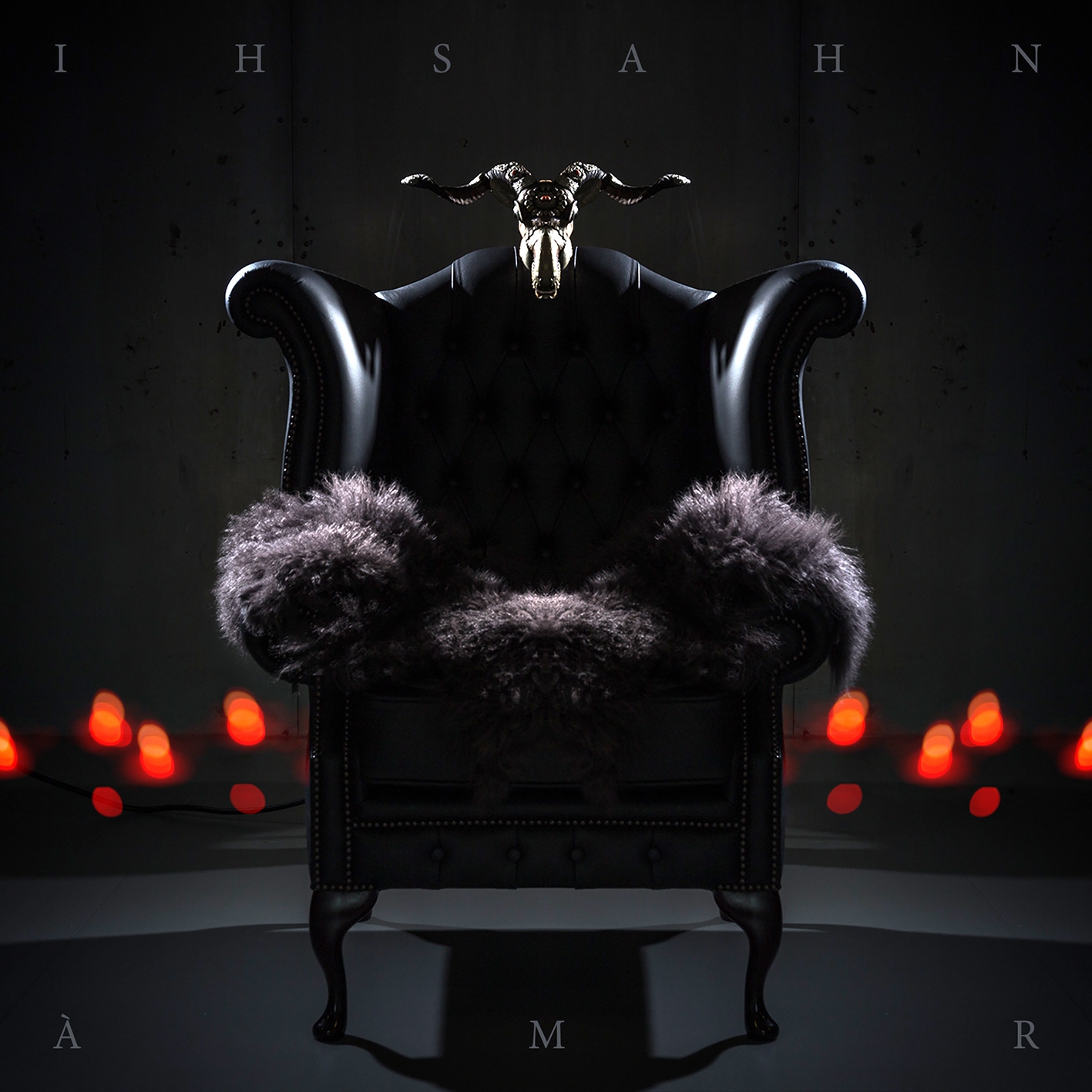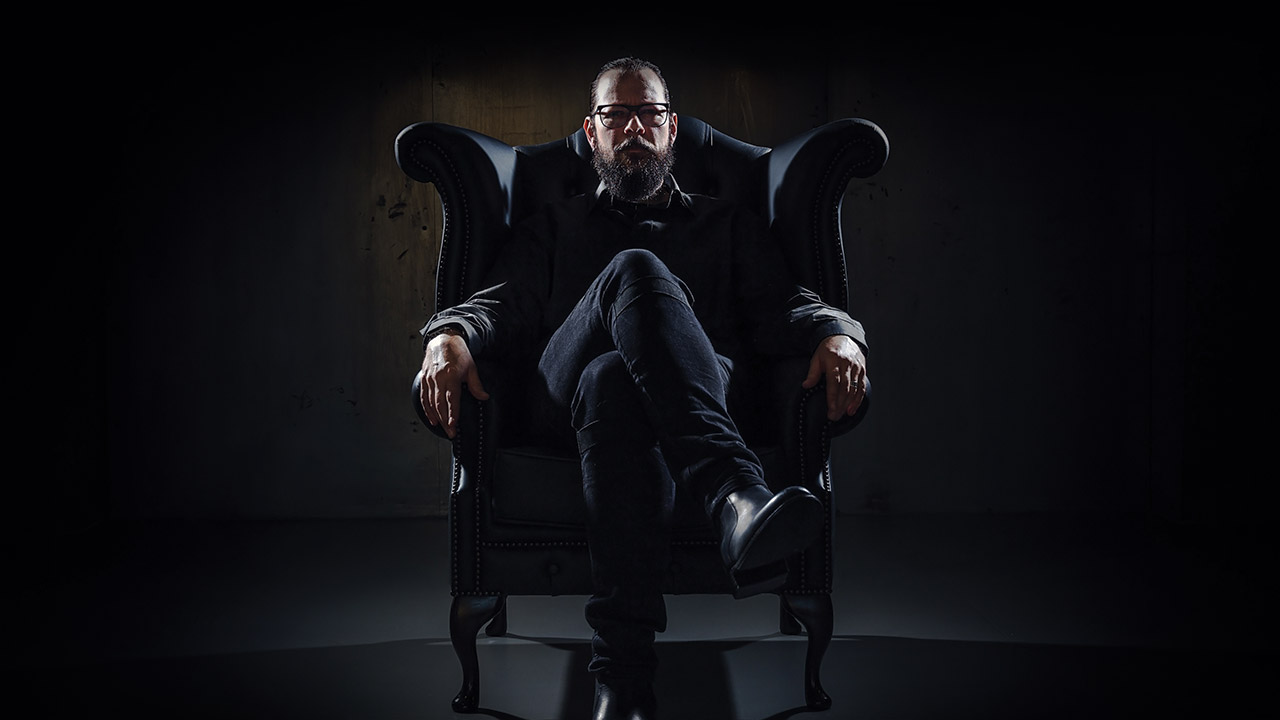
He might be a member of one of black metal’s most influential bands, but Ihsahn is not here to be categorised. Sitting in a side room at his label’s London offices, he looks smart and groomed in skinny jeans, Chelsea boots and trendy glasses, a world away from his early days in Emperor when the three-piece wore full corpsepaint. His dedicated fans know he hasn’t been that person for many a year, but even now, with his solo material becoming ever more accessible and eclectic, he finds himself drawing the ire of black metal fans who feel he’s strayed too far from his roots.
“With every kind of underground movement or expression that gets any kind of commercial success, it always starts out like that,” Ihsahn says. He’s warm, intelligent and softly-spoken, and it’s clear this is something he’s given some thought to. “Somebody discovers something they haven’t heard before and they take it to an extreme, and suddenly there are people who say, ‘This is the blueprint, let’s not change it.’”

Listening to Ihsahn’s solo work from the past five years, it’s clear he’s relished twisting and developing that black metal blueprint. From the 2013 album Das Seelenbrechen, through to 2016’s polar region-inspired Arktis, and on to latest record Àmr, bombastic riffs, 80s pomp and progressive melodies have become ever more present, united under the guidance of Ihsahn’s purposeful, gravelly bark. The darkness and grit of his black metal roots are still there on Àmr, but it could be his most accessible recording yet.
“I still define my music as black metal because it’s the same uncompromising starting point,” he says when quizzed about where he sees himself on the genre spectrum. “It’s such a paradox – I’ve seen it all through the years. Part of the black metal scene is very judgemental. People say, ‘You’re not allowed to do that,’ within black metal. Whereas if any genre was self-centred and do-what-I-will, it’s black metal. Do you really want a true black metal album made to people’s expectations? It defeats the whole purpose. I remember on my first album I had a song title with the word ‘love’ in it and people were enraged. The song is called Will You Love Me Now, and it asks, ‘If I present this as what it is, will you still be able to relate to it for the music and expression of what it is, or will you be biased because it doesn’t fit with what you want it to be?’ The reaction proved my point.”
The reaction to Àmr is likely to be just as divided. The first single, Arcana Imperii, boasts an 80s riff, while Sámr is a slice of stripped-back, avant-garde pop with 808s and sustained vocal notes that has more in common with Opeth than Emperor. Where You Are Lost And I Belong and In Rites Of Passage mix the dry, stunted guitars of black metal with classic riffs and psychedelic synths, while Twin Black Angels boasts thick double tracking, whimsical harmonies and a frankly karaoke-worthy chorus. Wake isn’t dissimilar to what newer prog-affiliated acts like Black Peaks produce, but with a few more blastbeats.
“I grew up in the 80s,” laughs Ihsahn, when drawn on his penchant for flamboyant riffs. “In a similar way to Arktis, Àmr is very verse-bridge-chorus. I wanted to focus on this album on more traditional song structures. It sounds strange within this type of music, but I wanted a good hook.
“Creating melody lines that stick is a challenge with extreme metal – you can have 15 or 20 different riffs. Writing within that format is a more difficult task – you have to use your craftsmanship to keep it from repeating and being boring.”

To bring himself out of his comfort zone, Ihsahn looked in some surprising places. “The Weeknd, Kanye West, James Blake… a lot of the production techniques. Obviously with The Weeknd, it’s very hard for me to relate to that drug-induced, decadent lifestyle of Los Angeles. But I dig the sincerity and that eerie vibe. I’ve seen some of his music videos and they’re really trippy. Those deep 808s have a sincerity and fuck-off attitude that’s missing from current metal. It’s very politically correct. I think some hip hop and urban music has more danger than metal. At the same time, I’ve been listening to a lot of ABBA, and I’m a big fan of Scott Walker.”
It may not be prog in the traditional sense, but Àmr is certainly progressive in its genre-hopping. The expectation of what Ihsahn represents to those who aren’t as familiar with him, though, leads him to be overlooked sometimes by prog stalwarts.
“I’m working with a booking agency who have been pushing my stuff to more progressive music festivals, and they’ve got the response that it’s probably too extreme for their festival,” he says. “The perception was ‘This is Emperor, black metal’, and as a solo artist I was doing similar stuff. Then they heard the album and got the feedback that it was perfect for their festival. Many people think I get the advantage of being a known name, but just as often it can work against you and people will limit you to that form.”
The barometer Ihsahn finds himself set against led him to think more deeply about people’s ingrained beliefs. “People are very afraid of liking something,” he muses. “Maybe they think because it’s black metal they might be condoning values or bad stuff they can’t stand by. Which is typical – people are very afraid of different opinions. Often in this business you get to meet people with very extreme attitudes, which for many of us is very interesting. How do they come to that conclusion?
“I meet a lot of people who feel threatened by someone having a different opinion. I find it very strange that they’d rather settle for a set of values and avoid questioning their own values and defending that, and setting those parameters.”
It seems his intellectual approach of why people gravitate to certain things allows him to be comfortable with creating solo work in his own way, while still periodically appearing with Emperor. Despite not having released an album since 2001, Emperor haven’t broken up, but Ihsahn says that nostalgia is the driving force that keeps them together, rather than any possibilities of making music again.
“On the 20th anniversary of our second album, we were more at a level where we wanted to do a few shows,” he says, explaining that he’d previously felt some reluctance to perform with Emperor because he didn’t want it to get “mixed up” with his solo career. “Those first two Emperor albums were such an important starting point. We were playing some of the biggest stages you could imagine for this style of music, we played back-to-back with some of our favourite heroes from the 80s, almost running into Ian Gillan on the way off stage. What’s not to like? But for every seven shows we do, we might turn down 100.”
Ihsahn says that he and fellow Emperor member Samoth have moved on too far to be able to recreate the songwriting bond they had in the early days.
“When people ask for another album, the craving is really just to relive a certain experience of discovering something that was exciting, fresh and new. No new Emperor album could satisfy that craving,” he insists. “With my solo work I’m totally creatively free: this is how I write metal. I get to do all these experiments without having to worry about any other band members telling me not to. I doubt we can do Emperor albums with eight-string guitars and saxophone. From my perspective, doing an Emperor album in that natural creative flow would be a compromise.
“When we wrote material for the first Emperor album I was 16 – how much experience do you have?” he continues. “It was made on gut feeling; more on youthful energy than experience. Samoth and I put in just as much time but over the years I took over more and more of the music side. By the second album I was writing all the lyrics and I’ve always had responsibility for all the arrangements and keyboards and playing bass.”
The obvious choice, then, was to focus all his efforts on his solo work, which he composes single-handedly in his home studio, with creative input from his wife Heidi. “She’s the most crucial, and the most invisible person,” he says. “The cover of the album, the title of the album… her ideas.”
His regular collaborator Tobias Ørnes Andersen came back on board for Àmr, and the pop elements were brought to life by Linus Corneliusson at Fascination Street Studios. The small, close-knit team Ihsahn has assembled around him help him realise his visions of creating music that can’t be easily pinned down, and operate under his main guiding principle of sonic freedom.
This article originally appeared in issue 87 of Prog Magazine.







